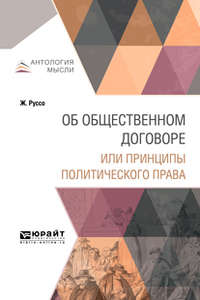 полная версия
полная версияThe Confessions of Jean Jacques Rousseau — Volume 10
My arrival caused a sensation. I never met a better reception. An observer would have thought the whole company felt how much I stood in need of encouragement. None but French hearts are susceptible of this kind of delicacy. However, I found more people than I expected to see. Amongst others the Comte d' Houdetot, whom I did not know, and his sister Madam de Blainville, without whose company I should have been as well pleased. She had the year before came several times to Eaubonne, and her sister-in-law had left her in our solitary walks to wait until she thought proper to suffer her to join us. She had harbored a resentment against me, which during this dinner she gratified at her ease. The presence of the Comte d' Houdetot and Saint Lambert did not give me the laugh on my side, and it may be judged that a man embarrassed in the most common conversations was not very brilliant in that which then took place. I never suffered so much, appeared so awkward, or received more unexpected mortifications. As soon as we had risen from table, I withdrew from that wicked woman; I had the pleasure of seeing Saint Lambert and Madam de'Houdetot approach me, and we conversed together a part of the afternoon, upon things very indifferent it is true, but with the same familiarity as before my involuntary error. This friendly attention was not lost upon my heart, and could Saint Lambert have read what passed there, he certainly would have been satisfied with it. I can safely assert that although on my arrival the presence of Madam d'Houdetot gave me the most violent palpitations, on returning from the house I scarcely thought of her; my mind was entirely taken up with Saint Lambert.
Notwithstanding the malignant sarcasms of Madam de Blainville, the dinner was of great service to me, and I congratulated myself upon not having refused the invitation. I not only discovered that the intrigues of Grimm and the Holbachiens had not deprived me of my old acquaintance,
[Such is the simplicity of my heart was my opinion when I wrote these confessions.]
but, what flattered me still more, that Madam d'Houdetot and Saint Lambert were less changed than I had imagined, and I at length understood that his keeping her at a distance from me proceeded more from jealousy than from disesteem. This was a consolation to me, and calmed my mind. Certain of not being an object of contempt in the eyes of persons whom I esteemed, I worked upon my own heart with greater courage and success. If I did not quite extinguish in it a guilty and an unhappy passion, I at least so well regulated the remains of it that they have never since that moment led me into the most trifling error. The copies of Madam d' Houdetot, which she prevailed upon me to take again, and my works, which I continued to send her as soon as they appeared, produced me from her a few notes and messages, indifferent but obliging. She did still more, as will hereafter appear, and the reciprocal conduct of her lover and myself, after our intercourse had ceased, may serve as an example of the manner in which persons of honor separate when it is no longer agreeable to them to associate with each other.
Another advantage this dinner procured me was its being spoken of in Paris, where it served as a refutation of the rumor spread by my enemies, that I had quarrelled with every person who partook of it, and especially with M. d'Epinay. When I left the Hermitage I had written him a very polite letter of thanks, to which he answered not less politely, and mutual civilities had continued, as well between us as between me and M. de la Lalive, his brother-in-law, who even came to see me at Montmorency, and sent me some of his engravings. Excepting the two sisters-in-law of Madam d'Houdetot, I have never been on bad terms with any person of the family.
My letter to D'Alembert had great success. All my works had been very well received, but this was more favorable to me. It taught the public to guard against the insinuations of the Coterie Holbachique. When I went to the Hermitage, this Coterie predicted with its usual sufficiency, that I should not remain there three months. When I had stayed there twenty months, and was obliged to leave it, I still fixed my residence in the country. The Coterie insisted this was from a motive of pure obstinacy, and that I was weary even to death of my retirement; but that, eaten up with pride, I chose rather to become a victim of my stubbornness than to recover from it and return to Paris. The letter to D'Alembert breathed a gentleness of mind which every one perceived not to be affected. Had I been dissatisfied with my retreat, my style and manner would have borne evident marks of my ill-humor. This reigned in all the works I had written in Paris; but in the first I wrote in the country not the least appearance of it was to be found. To persons who knew how to distinguish, this remark was decisive. They perceived I was returned to my element.
Yet the same work, notwithstanding all the mildness it breathed, made me by a mistake of my own and my usual ill-luck, another enemy amongst men of letters. I had become acquainted with Marmontel at the house of M. de la Popliniere, and his acquaintance had been continued at that of the baron. Marmontel at that time wrote the 'Mercure de France'. As I had too much pride to send my works to the authors of periodical publications, and wishing to send him this without his imagining it was in consequence of that title, or being desirous he should speak of it in the Mercure, I wrote upon the book that it was not for the author of the Mercure, but for M. Marmontel. I thought I paid him a fine compliment; he mistook it for a cruel offence, and became my irreconcilable enemy. He wrote against the letter with politeness, it is true, but with a bitterness easily perceptible, and since that time has never lost an opportunity of injuring me in society, and of indirectly ill-treating me in his works. Such difficulty is there in managing the irritable self-love of men of letters, and so careful ought every person to be not to leave anything equivocal in the compliments they pay them.
Having nothing more to disturb me, I took advantage of my leisure and independence to continue my literary pursuits with more coherence. I this winter finished my Eloisa, and sent it to Rey, who had it printed the year following. I was, however, interrupted in my projects by a circumstance sufficiently disagreeable. I heard new preparations were making at the opera-house to give the 'Devin du Village'. Enraged at seeing these people arrogantly dispose of my property, I again took up the memoir I had sent to M. D'Argenson, to which no answer had been returned, and having made some trifling alterations in it, I sent the manuscript by M. Sellon, resident from Geneva, and a letter with which he was pleased to charge himself, to the Comte de St. Florentin, who had succeeded M. D'Argenson in the opera department. Duclos, to whom I communicated what I had done, mentioned it to the 'petits violons', who offered to restore me, not my opera, but my freedom of the theatre, which I was no longer in a situation to enjoy. Perceiving I had not from any quarter the least justice to expect, I gave up the affair; and the directors of the opera, without either answering or listening to my reasons, have continued to dispose as of their own property, and to turn to their profit, the Devin du Village, which incontestably belong to nobody but myself.
Since I had shaken off the yoke of my tyrants, I led a life sufficiently agreeable and peaceful; deprived of the charm of too strong attachments I was delivered from the weight of their chains. Disgusted with the friends who pretended to be my protectors, and wished absolutely to dispose of me at will, and in spite of myself, to subject me to their pretended good services, I resolved in future to have no other connections than those of simple benevolence. These, without the least constraint upon liberty, constitute the pleasure of society, of which equality is the basis. I had of them as many as were necessary to enable me to taste of the charm of liberty without being subject to the dependence of it; and as soon as I had made an experiment of this manner of life, I felt it was the most proper to my age, to end my days in peace, far removed from the agitations, quarrels and cavillings in which I had just been half submerged.
During my residence at the Hermitage, and after my settlement at Montmorency, I had made in the neighborhood some agreeable acquaintance, and which did not subject me to any inconvenience. The principal of these was young Loiseau de Mauleon, who, then beginning to plead at the bar, did not yet know what rank he would one day hold there. I for my part was not in the least doubt about the matter. I soon pointed out to him the illustrious career in the midst of which he is now seen, and predicted that, if he laid down to himself rigid rules for the choice of causes, and never became the defender of anything but virtue and justice, his genius, elevated by this sublime sentiment, would be equal to that of the greatest orators. He followed my advice, and now feels the good effects of it. His defence of M. de Portes is worthy of Demosthenes. He came every year within a quarter of a league of the Hermitage to pass the vacation at St. Brice, in the fife of Mauleon, belonging to his mother, and where the great Bossuet had formerly lodged. This is a fief, of which a like succession of proprietors would render nobility difficult to support.
I had also for a neighbor in the same village of St. Brice, the bookseller Guerin, a man of wit, learning, of an amiable disposition, and one of the first in his profession. He brought me acquainted with Jean Neaulme, bookseller of Amsterdam, his friend and correspondent, who afterwards printed Emilius.
I had another acquaintance still nearer than St. Brice, this was M. Maltor, vicar of Groslay, a man better adapted for the functions of a statesman and a minister, than for those of the vicar of a village, and to whom a diocese at least would have been given to govern if talents decided the disposal of places. He had been secretary to the Comte de Luc, and was formerly intimately acquainted with Jean Bapiste Rousseau. Holding in as much esteem the memory of that illustrious exile, as he held the villain who ruined him in horror; he possessed curious anecdotes of both, which Segur had not inserted in the life, still in manuscript, of the former, and he assured me that the Comte de Luc, far from ever having had reason to complain of his conduct, had until his last moment preserved for him the warmest friendship. M. Maltor, to whom M. de Vintimille gave this retreat after the death of his patron, had formerly been employed in many affairs of which, although far advanced in years, he still preserved a distinct remembrance, and reasoned upon them tolerably well. His conversation, equally amusing and instructive, had nothing in it resembling that of a village pastor: he joined the manners of a man of the world to the knowledge of one who passes his life in study. He, of all my permanent neighbors, was the person whose society was the most agreeable to me.
I was also acquainted at Montmorency with several fathers of the oratory, and amongst others Father Berthier, professor of natural philosophy; to whom, notwithstanding some little tincture of pedantry, I become attached on account of a certain air of cordial good nature which I observed in him. I had, however, some difficulty to reconcile this great simplicity with the desire and the art he had of everywhere thrusting himself into the company of the great, as well as that of the women, devotees, and philosophers. He knew how to accommodate himself to every one. I was greatly pleased with the man, and spoke of my satisfaction to all my other acquaintances. Apparently what I said of him came to his ear. He one day thanked me for having thought him a good-natured man. I observed something in his forced smile which, in my eyes, totally changed his physiognomy, and which has since frequently occurred to my mind. I cannot better compare this smile than to that of Panurge purchasing the Sheep of Dindenaut. Our acquaintance had begun a little time after my arrival at the Hermitage, to which place he frequently came to see me. I was already settled at Montmorency when he left it to go and reside at Paris. He often saw Madam le Vasseur there. One day, when I least expected anything of the kind, he wrote to me in behalf of that woman, informing me that Grimm offered to maintain her, and to ask my permission to accept the offer. This I understood consisted in a pension of three hundred livres, and that Madam le Vasseur was to come and live at Deuil, between the Chevrette and Montmorency. I will not say what impression the application made on me. It would have been less surprising had Grimm had ten thousand livres a year, or any relation more easy to comprehend with that woman, and had not such a crime been made of my taking her to the country, where, as if she had become younger, he was now pleased to think of placing her. I perceived the good old lady had no other reason for asking my permission, which she might easily have done without, but the fear of losing what I already gave her, should I think ill of the step she took. Although this charity appeared to be very extraordinary, it did not strike me so much then as afterwards. But had I known even everything I have since discovered, I should still as readily have given my consent as I did and was obliged to do, unless I had exceeded the offer of M. Grimm. Father Berthier afterwards cured me a little of my opinion of his good nature and cordiality, with which I had so unthinkingly charged him.
This same Father Berthier was acquainted with two men, who, for what reason I know not, were to become so with me; there was but little similarity between their taste and mine. They were the children of Melchisedec, of whom neither the country nor the family was known, no more than, in all probability, the real name. They were Jansenists, and passed for priests in disguise, perhaps on account of their ridiculous manner of wearing long swords, to which they appeared to have been fastened. The prodigious mystery in all their proceedings gave them the appearance of the heads of a party, and I never had the least doubt of their being the authors of the 'Gazette Ecclesiastique'. The one, tall, smooth-tongued, and sharping, was named Ferrand; the other, short, squat, a sneerer, and punctilious, was a M. Minard. They called each other cousin. They lodged at Paris with D'Alembert, in the house of his nurse named Madam Rousseau, and had taken at Montmorency a little apartment to pass the summers there. They did everything for themselves, and had neither a servant nor runner; each had his turn weekly to purchase provisions, do the business of the kitchen, and sweep the house. They managed tolerably well, and we sometimes ate with each other. I know not for what reason they gave themselves any concern about me: for my part, my only motive for beginning an acquaintance with them was their playing at chess, and to make a poor little party I suffered four hours' fatigue. As they thrust themselves into all companies, and wished to intermeddle in everything, Theresa called them the gossips, and by this name they were long known at Montmorency.
Such, with my host M. Mathas, who was a good man, were my principal country acquaintance. I still had a sufficient number at Paris to live there agreeably whenever I chose it, out of the sphere of men of letters, amongst whom Duclos, was the only friend I reckoned: for De Levre was still too young, and although, after having been a witness to the manoeuvres of the philosophical tribe against me, he had withdrawn from it, at least I thought so, I could not yet forget the facility with which he made himself the mouthpiece of all the people of that description.
In the first place I had my old and respectable friend Roguin. This was a good old-fashioned friend for whom I was not indebted to my writings but to myself, and whom for that reason I have always preserved. I had the good Lenieps, my countryman, and his daughter, then alive, Madam Lambert. I had a young Genevese, named Coindet, a good creature, careful, officious, zealous, who came to see me soon after I had gone to reside at the Hermitage, and, without any other introducer than himself, had made his way into my good graces. He had a taste for drawing, and was acquainted with artists. He was of service to me relative to the engravings of the New Eloisa; he undertook the direction of the drawings and the plates, and acquitted himself well of the commission.
I had free access to the house of M. Dupin, which, less brilliant than in the young days of Madam Dupin, was still, by the merit of the heads of the family, and the choice of company which assembled there, one of the best houses in Paris. As I had not preferred anybody to them, and had separated myself from their society to live free and independent, they had always received me in a friendly manner, and I was always certain of being well received by Madam Dupin. I might even have counted her amongst my country neighbors after her establishment at Clichy, to which place I sometimes went to pass a day or two, and where I should have been more frequently had Madam Dupin and Madam de Chenonceaux been upon better terms. But the difficulty of dividing my time in the same house between two women whose manner of thinking was unfavorable to each other, made this disagreeable: however I had the pleasure of seeing her more at my ease at Deuil, where, at a trifling distance from me, she had taken a small house, and even at my own habitation, where she often came to see me.
I had likewise for a friend Madam de Crequi, who, having become devout, no longer received D'Alembert, Marmontel, nor a single man of letters, except, I believe the Abbe Trublet, half a hypocrite, of whom she was weary. I, whose acquaintance she had sought lost neither her good wishes nor intercourse. She sent me young fat pullets from Mons, and her intention was to come and see me the year following had not a journey, upon which Madam de Luxembourg determined, prevented her. I here owe her a place apart; she will always hold a distinguished one in my remembrance.
In this list I should also place a man whom, except Roguin, I ought to have mentioned as the first upon it; my old friend and brother politician, De Carrio, formerly titulary secretary to the embassy from Spain to Venice, afterwards in Sweden, where he was charge des affaires, and at length really secretary to the embassy from Spain at Paris. He came and surprised me at Montmorency when I least expected him. He was decorated with the insignia of a Spanish order, the name of which I have forgotten, with a fine cross in jewelry. He had been obliged, in his proofs of nobility, to add a letter to his name, and to bear that of the Chevalier de Carrion. I found him still the same man, possessing the same excellent heart, and his mind daily improving, and becoming more and more amiable. We would have renewed our former intimacy had not Coindet interposed according to custom, taken advantage of the distance I was at from town to insinuate himself into my place, and, in my name, into his confidence, and supplant me by the excess of his zeal to render me services.
The remembrance of Carrion makes me recollect one of my country neighbors, of whom I should be inexcusable not to speak, as I have to make confession of an unpardonable neglect of which I was guilty towards him: this was the honest M. le Blond, who had done me a service at Venice, and, having made an excursion to France with his family, had taken a house in the country, at Birche, not far from Montmorency.
[When I wrote this, full of my blind confidence, I was far from suspecting the real motive and the effect of his journey to Paris.]
As soon as I heard he was my neighbor, I, in the joy of my heart, and making it more a pleasure than a duty, went to pay him a visit. I set off upon this errand the next day. I was met by people who were coming to see me, and with whom I was obliged to return. Two days afterwards I set off again for the same purpose: he had dined at Paris with all his family. A third time he was at home: I heard the voice of women, and saw, at the door, a coach which alarmed me. I wished to see him, at least for the first time, quite at my ease, that we might talk over what had passed during our former connection.
In fine, I so often postponed my visit from day to day, that the shame of discharging a like duty so late prevented me from doing it at all; after having dared to wait so long, I no longer dared to present myself. This negligence, at which M. le Blond could not but be justly offended, gave, relative to him, the appearance of ingratitude to my indolence, and yet I felt my heart so little culpable that, had it been in my power to do M. le Blond the least service, even unknown to himself, I am certain he would not have found me idle. But indolence, negligence and delay in little duties to be fulfilled have been more prejudicial to me than great vices. My greatest faults have been omissions: I have seldom done what I ought not to have done, and unfortunately it has still more rarely happened that I have done what I ought.
Since I am now upon the subject of my Venetian acquaintance, I must not forget one which I still preserved for a considerable time after my intercourse with the rest had ceased. This was M. de Joinville, who continued after his return from Genoa to show me much friendship. He was fond of seeing me and of conversing with me upon the affairs of Italy, and the follies of M. de Montaigu, of whom he of himself knew many anecdotes, by means of his acquaintance in the office for foreign affairs in which he was much connected. I had also the pleasure of seeing at my house my old comrade Dupont who had purchased a place in the province of which he was, and whose affairs had brought him to Paris. M. de Joinville became by degrees so desirous of seeing me, that he in some measure laid me under constraint; and, although our places of residence were at a great distance from each other, we had a friendly quarrel when I let a week pass without going to dine with him. When he went to Joinville he was always desirous of my accompanying him; but having once been there to pass a week I had not the least desire to return. M. de Joinville was certainly an honest man, and even amiable in certain respects but his understanding was beneath mediocrity; he was handsome, rather fond of his person and tolerably fatiguing. He had one of the most singular collections perhaps in the world, to which he gave much of his attention and endeavored to acquire it that of his friends, to whom it sometimes afforded less amusement than it did to himself. This was a complete collection of songs of the court and Paris for upwards of fifty years past, in which many anecdotes were to be found that would have been sought for in vain elsewhere. These are memoirs for the history of France, which would scarcely be thought of in any other country.
One day, whilst we were still upon the very best terms, he received me so coldly and in a manner so different from that which was customary to him, that after having given him an opportunity to explain, and even having begged him to do it, I left his house with a resolution, in which I have persevered, never to return to it again; for I am seldom seen where I have been once ill received, and in this case there was no Diderot who pleaded for M. de Joinville. I vainly endeavored to discover what I had done to offend him; I could not recollect a circumstance at which he could possibly have taken offence. I was certain of never having spoken of him or his in any other than in the most honorable manner; for he had acquired my friendship, and besides my having nothing but favorable things to say of him, my most inviolable maxim has been that of never speaking but in an honorable manner of the houses I frequented.
At length, by continually ruminating. I formed the following conjecture: the last time we had seen each other, I had supped with him at the apartment of some girls of his acquaintance, in company with two or three clerks in the office of foreign affairs, very amiable men, and who had neither the manner nor appearance of libertines; and on my part, I can assert that the whole evening passed in making melancholy reflections on the wretched fate of the creatures with whom we were. I did not pay anything, as M. de Joinville gave the supper, nor did I make the girls the least present, because I gave them not the opportunity I had done to the padoana of establishing a claim to the trifle I might have offered, We all came away together, cheerfully and upon very good terms. Without having made a second visit to the girls, I went three or four days afterwards to dine with M. de Joinville, whom I had not seen during that interval, and who gave me the reception of which I have spoken. Unable to suppose any other cause for it than some misunderstanding relative to the supper, and perceiving he had no inclination to explain, I resolved to visit him no longer, but I still continued to send him my works: he frequently sent me his compliments, and one evening, meeting him in the green-room of the French theatre, he obligingly reproached me with not having called to see him, which, however, did not induce me to depart from my resolution. Therefore this affair had rather the appearance of a coolness than a rupture. However, not having heard of nor seen him since that time, it would have been too late after an absence of several years, to renew my acquaintance with him. It is for this reason M. de Joinville is not named in my list, although I had for a considerable time frequented his house.









